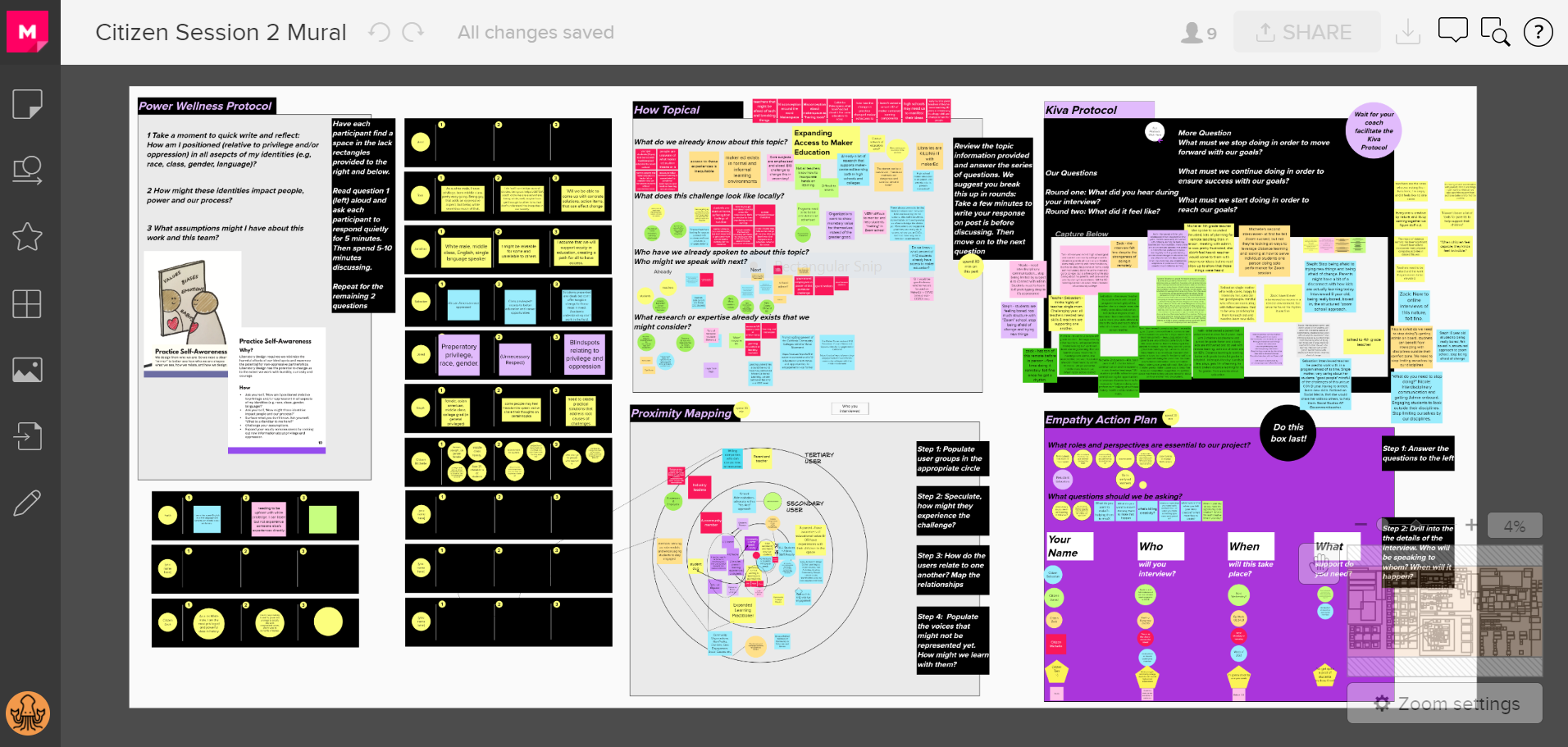Leveraging Design Thinking for Maker-Centered Learning through the Reach for the Upside Initiative
The Makers + Mentors Network team attended workshops as part of the Reach for the Upside initiative. Here, team members share drawings of their favorite shoe in middle school.
Citizen Schools Makers + Mentors Network is leading a team as part of the Reach for the Upside initiative, hosted by the K12 Lab at Stanford's Hasso Plattner Institute of Design (the “d.school”) in partnership with Genentech and with participation of Northern California Community foundations.
Reach for the Upside is focused on engaging California public school districts and their community partners in leveraging design thinking to see what ideas they can generate to turn the constraints of the COVID-19 era into opportunities for students, teachers, and families. Citizen Schools is one of 12 teams led by non-profit organizations and school districts selected to participate in a 7-week “design sprint” focused on addressing a specific education challenge. This design team will attend four workshops and three coaching sessions on innovation.
Once the design sprint of workshops and coaching sessions concludes in late March 2021, Makers + Mentors Network and design team partners have the potential to receive between $50,000–$200,000 from Genentech to fund the initiative developed during the sprint. Through this process, the Citizen Schools team will further explore how to create more sustainable pathways and grow the capacity for all K-12 students to pursue post-secondary education and career development through maker-centered learning in the Greater Sacramento area. Stephanie Santoso, Director of Strategic Initiatives for Makers + Mentors Network, remarked about this exciting project:
“Reach for the Upside! is a unique opportunity for our team of thought leaders in the greater Sacramento area to co-design approaches to maker-centered learning with the local community that will engage and empower all students in making and inspire them to solve important problems they care about.”
Citizen Schools’ Makers + Mentors Network is a national leader in partnering with communities and organizations to uplift STEM mentoring and maker-centered learning. The Reach for the Upside Spring design team comprises Makers + Mentors Network and a working group of partner organizations, including Maker Fellows host sites:
Sierra College
Sacramento City College Makerspace
Cordova High School (Folsom Cordova Unified School District)
Sacramento County Office of Education
Folsom Lake College Innovation Center
Makers + Mentors Network team members share a mural that maps out the development of a prototype.
This group of like-minded institutions is looking forward to this continued collaboration. The design sprint challenge provides an additional innovation juncture when the COVID-19 pandemic has upended educational systems and learning environments, adding new constraints and limiting resources that are challenging educational infrastructures.
Working collectively around the theme of expanding access to maker education in the Greater Sacramento areas is critical because:
Maker-centered learning empowers students to develop their agency. It enables them to understand how they can positively impact the world around them through building, tinkering, and re-design.
Students develop critical thinking and problem-solving skills through making experiences. They have the opportunity to cultivate their creativity and curiosity while engaging in meaningful, hands-on, interdisciplinary learning experiences at the intersection of STEM, arts, and design.
Maker-centered learning increases all K-12 students' capacity to pursue post-secondary education and career development, creating new and sustainable pathways that can significantly impact students and their families' economic opportunities and quality of life.
Making facilitates social and emotional learning that is critical for individuals to thrive professionally throughout a student's life.
There are several key anticipated impacts from the design sprint. These include both short-term and long-term impacts:
Increase enrollment, graduation, job placement, and retention rates for students in post-secondary education institutions attributed to maker-centered learning pathways. (long-term)
Deepen existing relationships and develop new partnerships with regional employers, local industry, and chambers of commerce who view community college students as innovative problem solvers and community colleges as hubs for problem-solving. (long-term)
Create a model and set of best practices that could be applied in other communities across the U.S. for how Maker Fellows can help develop and implement these pathways. (short-term)
This exciting opportunity would not be possible without the generous support of Genentech and Stanford's Hasso Plattner Institute of Design.


